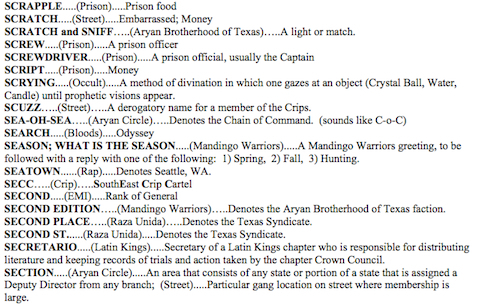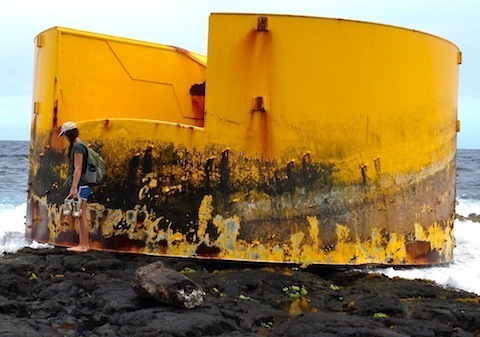Brendan I. Koerner's Blog, page 11
November 29, 2012
The Tongasat Affair, Cont’d

We last wrote about Tonga’s unusual space enterprise, Tongasat, back in December 2010, when we focused on the alleged religious motivations of Princess Pilolevu Tuita, the firm’s majority shareholder. After a long quiet spell, the controversial company is now back in the news, as a pawn in a political tug-of-war between a Tongan opposition leader and the nation’s current prime minister. The issue is a rather substantial windfall that Tongasat recently enjoyed, courtesy of the government of China. The story gets broken down here:
Claims in Tonga’s parliament that there was an illegal transference of government money to Tongasat have been denied by two Prime Ministers, in a row over how a USD$75 million grant from China to Tonga was used.
A payment of USD$25.45 million that was given by government to Tongasat in 2011 was approved by the former Prime Minister Lord Dr Feleti Sevele and came from a grant given by the Chinese government to Tonga in 2008…
Lord Sevele told Matangi Tonga last week that the $75.35 million Chinese grant to the Tongan government in 2008 was “not like other Chinese grants”, and there were reasons for that, which he asserted that he did not want to get into.
“If there was no Tongasat there would not have been any such grants. The grant were made because Tongasat was leasing orbital slots to the Chinese.”
But as to why the Chinese Government did not pay their dues straight to Tongasat, instead of giving the Tongan government a grant, then for the government to pay Tongasat, was not made clear.
Check out this excellent piece from The Space Review for more background on Tongasat’s sleight-of-hand. It’s clear to me that the Tongan royal family is earning a fortune by capitalizing on a public asset—namely, the orbital slots that the country is entitled to by international law. Call us cynical, but the “grant” just seems like a fig leaf designed to make this seem like a government-to-government transaction, rather than a pure pay-off to a privately held enterprise. Par for the course in Tonga, alas.
November 28, 2012
Rubber Suit Blues
Wobbling beneath the weight of two major projects at the moment—my next Wired opus and the copy edit for The Skies Belong to Us. In my brief absence, please marvel the awesomely sophisticated space monsters from 1962′s Planeta Bur, a masterpiece of Soviet sci-fi schlock.
November 26, 2012
Incarceration is the Mother of Invention

There are two things to marvel at in the Texas Prison Gangs Dictionary, which comes to us via the good folks over at Public Intelligence. The first is the incredible effort it took to document 168-pages worth of vocabulary that is expressly designed to be as indecipherable as possible. The second is the sheer linguistic inventiveness of the incarcerated, who essentially commit themselves to learning a second tongue in order to thrive behind bars. I would love to read a learned linguist’s take on whether all languages originate in not-too-dissimilar manners—as efforts to conceal the machinations of one group from those in power. Based on what I know about how English grew out of a vernacular employed by peasants whose masters spoke courtly French, I bet there’s more than a grain of truth to that assumption.
November 21, 2012
One of a Kind

I send you off into the Thanksgiving break with a special treat: an entire site dedicated to the 1981 spaceflight of Jügderdemidiin Gürragchaa, the only Mongolian to have soared into the heavens (albeit with Soviet help). The mission made Gürragchaa a national hero, a status that he later parlayed into a political career.
What is most incredible about the site is its logorrheic attempt to explain the scientific import of the mission. We remain convinced that the mission was primarily intended as a morale booster for Mongolia, which certainly needed good reason to stay in the diminishing Soviet fold. But we must confess that we’re intrigued by the experiment on display here; the photo’s caption on the site reads:
The projects “Chatsrgana/Buckthorn/” and “Borts/Dry meat/” prepared by Mongolian scientists is being introduced (Lkhagva and Urtnasan)
Perhaps that important advances in celestial borts knowledge justifies the triumphalism on display here.
November 19, 2012
A Voice from the Murk

Aside from being the native land of Microkhan’s most beloved soccer star, Benin is also currently home to one of the sketchiest political dramas in the Eastern Hemisphere. To hear the nation’s government tell it, President Yayi Boni (above) narrowly escaped death when a plot to poison him fell apart—a plot masterminded by a wealthy businessman named Patrice Talon, one of Boni’s staunchest former allies. But the details of the case seem more than a little head-scratching, to the point that the plot’s existence must be called into question. Talon himself recently weighed in from exile, and his interview with Radio France Internationale (translated from French) provides a compelling peek inside the machinery of a corrupt, dysfunctional state. Suffice to say that Talon admits nothing, and blames the whole affair on a falling out between himself and his powerful ex-friend:
Q: After the victory of Boni Yayi, you secured big markets, such as the management of the PVI, the audit programme of imports at the port of Cotonou. A few months ago, you lost this market, why?
Talon: For me, it may be a punishment.
Q: Is it for the same reason that you lost the monopoly on imports of inputs, fertilizers, insecticides, in the cotton sector?
Talon: I can say that yes. Always as punishment, it was brutally decided that the intervention of the private sector must stop; a sector, which is a responsibility for private activities in Benin for almost two decades. Therefore, everything was stopped overnight. But this is not the first time. I was stopped like that in the past, arbitrarily, for two years. I waited. You know, when you know you are right, you wait for the return of the truth. I`m used to it. One must also agree to get accustomed to this kind of setback and be patient. I know how to do this.
Q: This is the story of Superintendent Fouquet under Louis XIV! You became too rich, too powerful?
Talon: It is to be believed, but I think that my misfortune is to be too independent at times, not putting my person totally at the service of things which I do not believe in.
Talon is so obviously arrogant that it’s tough to entirely trust his denial of involvement in the alleged poisoning plot. But what he says about the unpredictability of Boni does ring true; the powerful have a way of turning on their closest associates for reasons that are clear to no one but themselves.
November 16, 2012
Defective Combs

Parent-teacher conference plus Wired deadline make today too hairy to Microkhan. See you back here on Monday, by which time I expect each and every one of you to have completed all 341 pages of The Mating and Breeding of Poultry. There will be a quiz.
November 14, 2012
“They Think Drums Are Not for Women”
I first became aware of Tajikistan’s tiny rock scene this past summer, when I read this dispatch about the straight-edge, black-metal band Al-Azif. I am always drawn to stories about artists who create despite hardship, and so I was naturally intrigued by the band’s zeal for playing Western music in such an oppressively conservative country. This more recent piece explores the scene further, and makes the case that one of the most irritating rap-rock acts in history may actually have a redeeming quality:
One Dushanbe band, Red Planet, is perhaps even more unorthodox than Al Azif. Taking to the stage in a rhinestone-encrusted T-shirt, 19-year-old Umida Fazilova gives a nod to her identical twin sister, Khursheda, sitting behind the drums and launches into a set of high-energy and emotionally charged metal.
“When I started playing rock music, everyone was laughing at me during our concerts,” Khursheda Fazilova said. “They think drums are not for women.”
The members of Red Planet met at a university and bonded over their love of Western heavy-metal bands such as Linkin Park. Although the Western influences in the Tajik rock scene are strong, the local style has an Eastern slant all of its own.
“Sure, we’re influenced by Western hard rock, punk, hard-core and even pop, but our roots are from the East,” Mr. Rock said. “We have songs with specific beats with Oriental melodies.”
Not quite sure I can detect the “Oriental melodies” in the Red Planet clip above, but I can’t help but love them nonetheless. There are few things more beautiful than people creating offbeat art against all odds. And Umida Fazilova has a fantastic coat.
November 13, 2012
A Scrappy Monolith

The object above washed ashore in the Hawaiian district of Ka’u last month, and has remained immobile ever since—no great surprise, perhaps, given that it weighs an estimated seven tons. State authorities are now in the process of two vital tasks: Figuring out how to dispose of the monstrosity, and figuring out what the heck it might be. The former mission will involve chopping up the object into bite-sized chunks that can then be airlifted away by helicopters; the latter will require the wisdom of someone well-versed in the taxonomy of gargantuan yellow things.
Are you that person? Care to hazard a guess as to what the object might be? I am leaning toward the Monolith hypothesis, which would indicate that alien super-beings are actually much less elegant craftsman than Arthur C. Clarke had envisioned.
November 9, 2012
Okada vs. Lagos
Okada are Lagos motorcyclists who earn cash by zipping customers through traffic, often with little regard for safety. The regional government recently banned okada from all major roadways, in part because the bikes are often used by robbers to flee from crime scenes. The prohibition hasn’t gone over well, however, for okada are more than just automotive hustlers—they’re also part of a distinct subculture that centers around a shared love of speed. And they are lashing out at the policemen enforcing the ban, who have no qualms about using violence at will.
If I were a betting man, I would ultimately place my money on the okada. They provide too valuable of a service to the general public—a last resort for people who are late for important appointments, and have no choice but to risk their lives to reach their destinations in time. Until Lagos is cured of its endemic traffic problems, there will always be plenty of demand for the okada. And it is ultimately demand that settles disputes like this, not policies issued from on high.
November 8, 2012
To My Former Captor
As I learned so long ago in the mind-blowing Summer of My German Soldier, thousands of Axis prisoners-or-war were housed in Arkansas during World War II. Upon their release at conflict’s end, many of the former captives kept in touch with their American bosses—the men they were forced to pick cotton for, in exchange for meager wages. As this amazing collection of letters demonstrates, there was a certain odd affection between the ex-POWs and their Razorback taskmasters:
Destruction here in Western Germany is unimaginable. Living conditions are awfully bad. Food is very scarce. My imagination very often goes back to those lucky times when we were working for you. Of course I am glad I am a relatively free man again, but there is hardly a possibility to enjoy one’s freedom. We are all working very hard to help to overcome the terrible destruction and emptiness left by the Nazi regime; it will take years and years, however, before there will be normal conditions again. In general, the German population is very willing to try to correct its faults. There are, in this zone at least, no signs of unrest and trouble, as far as I know. Maybe some day there will be a truly democratic Germany. That is the political aim I’m working for. I am glad I had the opportunity to learn to know parts of the American Way of Life; I hope that is the aim for Germany in political respect.
The letter-writers did seem to have an ulterior motive in many instances, though: Several of the epistles includes not-so-subtle requests for cigarettes and, more important, food. Apparently there was a time when Berlin wasn’t chock full of scrumptious doner-kebab stands.




